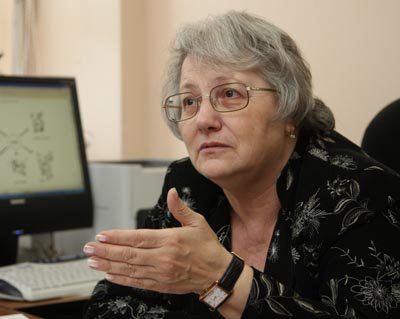The scientists of KSC SB RAS have informed about the technology for the creation of biodegradable plastics
22 May 2019 г.

«The global problem which concerns not only Russia is the accumulation of garbage, in particular, due to the production of long life polymer materials. It is expected that in the nearest future a law will be passed prohibiting using polymers, at least for packaging, which are not decomposed in the conditions of dumps. The company “SIBUR” is one of the advanced Russian enterprises, the main producer of polyethylene type polymers, polypropylene and polyethylene terephthalate, addresses the scientific society to state the problems of the creation of biodegradable polymers and to consider the options for their solutions», with these words the Chairman of SB RAS Valentin Parmon opened the meeting.
The principal research associate of the Institute of Biophysics of the Krasnoyarsk Science Center SB RAS, professor, Doctor of Biological Sciences, Tatyana Volkova notes that the Institute of Biophysics has a technology of creating biodegradable plastics - polyhydroxyalkanoates (PHA). These polymers are the products of the life activity of certain microorganisms under extreme conditions. PHAs can have different properties and chemical composition and are applicable in various spheres including medicine. In the presence of oxygen, PHAs are decomposed to carbon dioxide and water, in the absence of air – to methane and water.
« We have our own collection of cultures of microorganisms and not genetically modified ones but natural. For the latter the ambient conditions are not so critical and the microorganisms are rather stable. Using these collections we have created synthesis technologies of polymers of different structure and properties: from thermoplastic construction materials to rubber-like elastomers. It is possible to use synthesis gas from the coals of Kansk-Achinsk Coal Basin as a substrate for the microorganisms; this technology has no analogs, it is a unique development of SB RAS. Also, we have been able to obtain PHAs on different organic media (sugars, acetates, plant oils, glycerin) and studied the regularities of PHA bio-decomposition in natural ecosystems» as noted Tatyana Volkova.
The deputy chairman of the board of directors of PJSC «SIBUR Holding» Vladimir Razumov emphasizes that the company has experience in successful collaboration with academic science: «We have been working with the Institute of Catalysis SB RAS for a long time and with good results and we have recently started collaboration with other institutes of SB RAS. Having stated the problem of estimating the possibility for the creation of market oriented biodegradable polymers, we turn to scientists because we are sure: this will enable us to get interesting suggestions expressed by qualified specialists for the solution of our problems ».
At the end of the meeting the participants made a decision to continue collaboration and accumulating suggestions of scientific-research organizations which can be of interest for PJSC «SIBUR Holding», and then, to formulate and sign a resolution concerning the collaboration.
Source: Science in Russia
Share:
